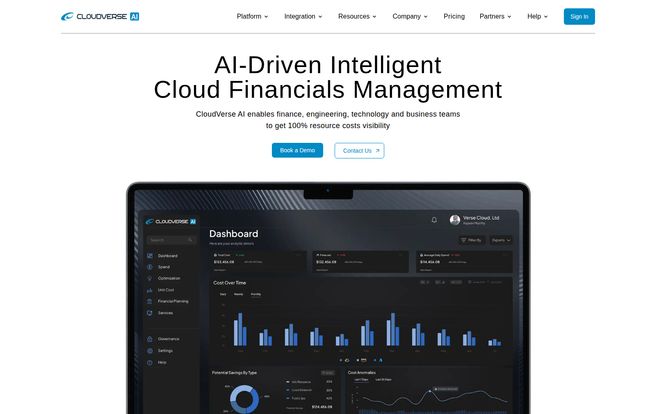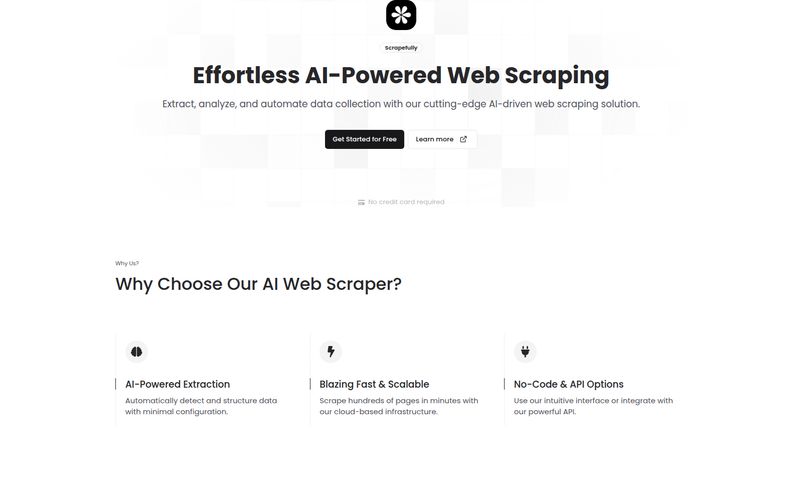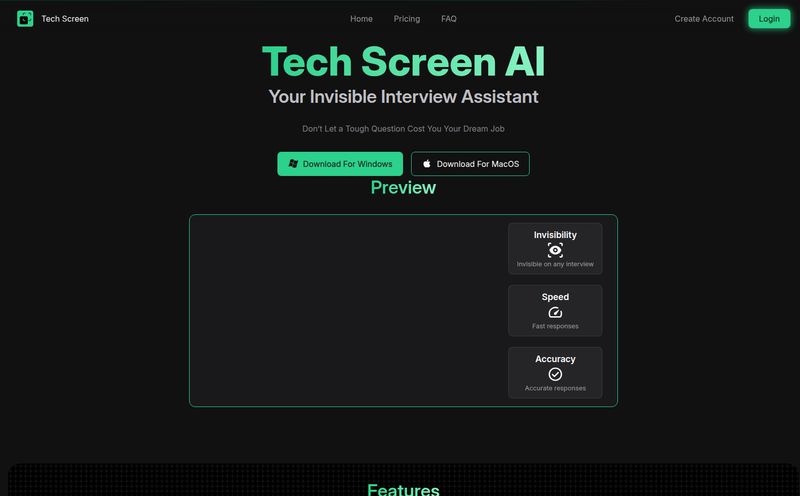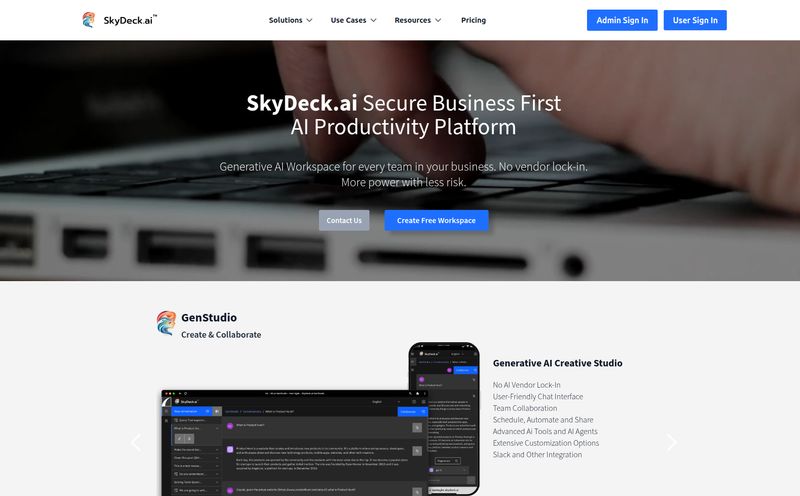If you’re juggling AWS, Azure, and GCP, your monthly cloud bill probably looks like a cryptic ancient text. Finance is asking questions you can't answer, your engineers are spinning up resources like there's no tomorrow, and you're stuck in the middle trying to be the United Nations of cloud spending. I’ve been there. I've seen teams build entire spreadsheets that would make an accountant weep, just to figure out which department is burning through the most cash.
It’s a mess. We call it “multicloud chaos,” and it’s a very real, very expensive problem.
So, when a tool like CloudVerse.AI pops up on my radar claiming to be an “AI-driven Intelligent Cloud Financials Management” platform, my ears perk up. But let's be honest, “AI-driven” is the new “organic” – it’s slapped on everything. The real question is, can it actually wrangle the beast? I decided to take a closer look.

Visit CloudVerse.AI
So What Is CloudVerse AI, Exactly?
Okay, cutting through the marketing fluff. CloudVerse AI aims to be the central nervous system for your entire cloud financial operations, or FinOps, as the cool kids call it. Think of it as a universal translator for your cloud bills. It pulls in all the cost and usage data from over seven public clouds (yep, the big three and more) and more than 100 different services. Instead of logging into five different dashboards, you get one unified view.
But it's not just a fancy dashboard. It’s built on a metacloud, API, and analytics layer. In plain English, that means it doesn’t just show you the data; it lets you act on it. It’s designed to be the one platform that your finance, engineering, and leadership teams can actually use together without speaking different languages. A single source of truth for cloud spend. A lofty goal, but a necessary one.
The Features That Genuinely Caught My Eye
Any platform can show you a graph. What I care about is what you can do with the information. Here’s where CloudVerse AI starts to get interesting.
Finally, True Multicloud Visibility
This is the table stakes for any FinOps tool, but it's surprising how many get it wrong. CloudVerse seems to understand the assignment. The idea of pulling everything into one place isn’t just about convenience. It’s about context. You can see how your spending on, say, AWS RDS compares to Azure SQL and make smarter architectural decisions. You can spot redundancies you’d never catch when looking at siloed reports. This, for me, is the foundational piece. Without a clear, consolidated picture, you're just guessing.
AI-Powered Insights That Aren’t Just a Gimmick
Here we go, the AI part. My skepticism was high, but the application here is practical. CloudVerse uses its AI for two things I find particularly valuable: optimization insights and anomaly detection.
Imagine getting an automated alert that says, “Hey, the dev team’s new project is running 30% hotter than projected, and here's a recommendation to resize these instances to save $800 a month.” That’s proactive. That’s useful. The anomaly detection is the other side of that coin—it’s your financial safety net. It watches for those sudden, terrifying spikes in spending that usually mean someone forgot a decimal point or a rogue script is running wild. It’s about catching a thousand-dollar mistake before it becomes a hundred-thousand-dollar catastrophe.
Bridging the Gap: Budgeting, Forecasting, and Chargebacks
This is where the finance team starts to get really excited. A pretty dashboard is nice, but being able to properly allocate costs is what gets budgets approved. CloudVerse provides the tools for chargeback and showback, which is a game-changer for creating accountability. You can finally go to the head of marketing and say, “Your campaign’s backend services cost exactly this much last month.”
When teams can see their own consumption, they start to self-regulate. It’s basic human psychology. The forecasting tools also help you move from being reactive to proactive, planning for future cloud spend instead of just being surprised by it.
Let’s Talk Turkey: The CloudVerse AI Pricing Structure
Alright, the all-important question: what’s this going to cost me? I appreciate that CloudVerse.AI is pretty upfront with its pricing, at least for its first two tiers. No “contact us for a demo just to see the price” nonsense, which I always respect. Here's how it breaks down:
| Plan | Price | Key Details |
|---|---|---|
| Starter | $500 / Month | For up to $250k annual cloud spend. Includes all features and unlimited users. |
| Professional | $1,000 / Month | For up to $1M annual cloud spend. Includes all features and unlimited users. |
| Enterprise | Custom | Unlimited spend, 5 years data retention, SOC2 Report, and a dedicated account manager. |
My take? The pricing is tiered by your annual spend, which makes a lot of sense. You pay more as your complexity grows. The Starter plan feels right for a growing company that's just starting to feel the pain of cloud sprawl. The Professional plan is a logical step up. The Enterprise plan is where it gets a bit murky with the “Custom” pricing, which is standard for this level. However, this is where you get the goodies like a dedicated account manager, 5-year data retention, and the all-important SOC2 report for compliance-heavy industries. It's a bit of a bummer that some of these are gated, but that's the nature of the SaaS beast.
Who Should Be Booking a Demo Right Now?
After digging in, I have a pretty clear idea of who would get the most out of CloudVerse AI.
This tool is a dream for:
- Companies deep in the multicloud ecosystem. If you’re on AWS and Azure, maybe with a bit of GCP for your data science team, this tool is built for you.
- Growing startups and scale-ups. You're moving fast and probably breaking things, including your cloud budget. A tool like this instills financial discipline before bad habits get set in stone.
- Enterprises needing strong governance. If you need to enforce budgets, perform accurate chargebacks, and maintain security and compliance across multiple teams and clouds, the Enterprise plan looks mighty attractive.
Who might not need it? If you're a small shop running everything on a single cloud and your bill is manageable with the native tools, this might be overkill. But once you add a second cloud or your spending starts to feel like a mystery novel, it's time to start looking.
My Final Verdict: Is CloudVerse AI Worth It?
Look, the FinOps space is getting crowded. There are a lot of tools promising to solve your cloud cost headaches. From what I’ve seen, CloudVerse AI is a very serious contender. It’s not just another reporting tool; it's a comprehensive management platform that seems to genuinely understand the relationship between engineering activity and financial outcomes.
The emphasis on multicloud unity, actionable AI insights, and robust financial controls is a powerful combination. It feels less like a tool and more like a strategy partner. The lack of total transparency on Enterprise pricing is a small gripe, but one that’s common in the B2B SaaS world.
If you're tired of playing whack-a-mole with your cloud bills and want to move toward a more mature, proactive FinOps culture, then yes, I'd say CloudVerse AI is absolutly worth a serious look. It might just be the conductor your chaotic cloud orchestra needs.
Frequently Asked Questions
- What clouds does CloudVerse.AI actually support?
- It supports over 7 public cloud providers, including the big three (AWS, Azure, GCP), and integrates with over 100 specific cloud services across them.
- How does CloudVerse.AI handle security?
- Security is a clear priority. The platform is ISO 27001 and SOC 2 Type II certified. The Enterprise plan also offers a dedicated SOC2 report, which is crucial for organizations with strict compliance requirements.
- How does the AI-driven optimization really work?
- It analyzes your usage patterns to find inefficiencies. For example, it might identify overprovisioned virtual machines, idle storage volumes, or recommend purchasing Reserved Instances or Savings Plans based on your consistent usage to secure lower rates.
- Can I get a dedicated account manager?
- Yes, a dedicated account manager is included with the Custom Enterprise plan. This is ideal for large organizations that need a high-touch support relationship.
- How does CloudVerse AI help with cost allocation?
- It provides powerful tools for showback and chargeback. It can ingest your existing tagging strategy or help you create a new one (their blog mentions 'virtual tagging') to accurately map cloud costs to specific projects, teams, or products, even for resources that are difficult to tag.
- Is there a free trial available?
- The website doesn't explicitly mention a free trial, but it prominently features a "Book a Demo" button. This is typical for platforms of this nature, where a guided walkthrough is often necessary to showcase the full value for your specific environment.



